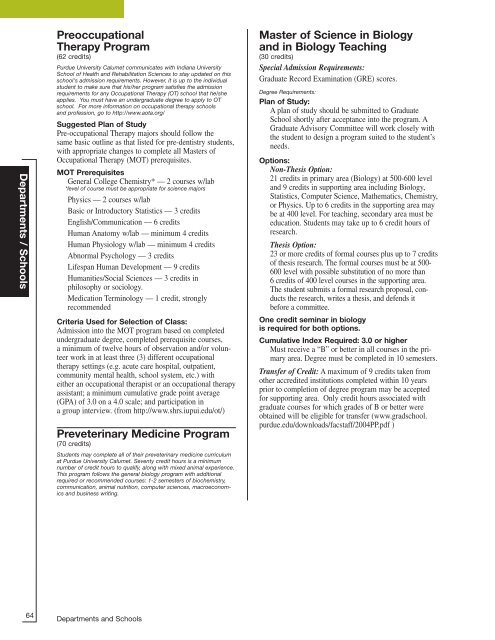ACADEMIC CATALOG - Purdue University Calumet
ACADEMIC CATALOG - Purdue University Calumet
ACADEMIC CATALOG - Purdue University Calumet
Create successful ePaper yourself
Turn your PDF publications into a flip-book with our unique Google optimized e-Paper software.
Departments / Schools<br />
Preoccupational<br />
Therapy Program<br />
(62 credits)<br />
<strong>Purdue</strong> <strong>University</strong> <strong>Calumet</strong> communicates with Indiana <strong>University</strong><br />
School of Health and Rehabilitation Sciences to stay updated on this<br />
school's admission requirements. However, it is up to the individual<br />
student to make sure that his/her program satisfies the admission<br />
requirements for any Occupational Therapy (OT) school that he/she<br />
applies. You must have an undergraduate degree to apply to OT<br />
school. For more information on occupational therapy schools<br />
and profession, go to http://www.aota.org/<br />
Suggested Plan of Study<br />
Pre-occupational Therapy majors should follow the<br />
same basic outline as that listed for pre-dentistry students,<br />
with appropriate changes to complete all Masters of<br />
Occupational Therapy (MOT) prerequisites.<br />
MOT Prerequisites<br />
General College Chemistry* — 2 courses w/lab<br />
*level of course must be appropriate for science majors<br />
Physics — 2 courses w/lab<br />
Basic or Introductory Statistics — 3 credits<br />
English/Communication — 6 credits<br />
Human Anatomy w/lab — minimum 4 credits<br />
Human Physiology w/lab — minimum 4 credits<br />
Abnormal Psychology — 3 credits<br />
Lifespan Human Development — 9 credits<br />
Humanities/Social Sciences — 3 credits in<br />
philosophy or sociology.<br />
Medication Terminology — 1 credit, strongly<br />
recommended<br />
Criteria Used for Selection of Class:<br />
Admission into the MOT program based on completed<br />
undergraduate degree, completed prerequisite courses,<br />
a minimum of twelve hours of observation and/or volunteer<br />
work in at least three (3) different occupational<br />
therapy settings (e.g. acute care hospital, outpatient,<br />
community mental health, school system, etc.) with<br />
either an occupational therapist or an occupational therapy<br />
assistant; a minimum cumulative grade point average<br />
(GPA) of 3.0 on a 4.0 scale; and participation in<br />
a group interview. (from http://www.shrs.iupui.edu/ot/)<br />
Preveterinary Medicine Program<br />
(70 credits)<br />
Students may complete all of their preveterinary medicine curriculum<br />
at <strong>Purdue</strong> <strong>University</strong> <strong>Calumet</strong>. Seventy credit hours is a minimum<br />
number of credit hours to qualify, along with mixed animal experience.<br />
This program follows the general biology program with additional<br />
required or recommended courses: 1-2 semesters of biochemistry,<br />
communication, animal nutrition, computer sciences, macroeconomics<br />
and business writing.<br />
Master of Science in Biology<br />
and in Biology Teaching<br />
(30 credits)<br />
Special Admission Requirements:<br />
Graduate Record Examination (GRE) scores.<br />
Degree Requirements:<br />
Plan of Study:<br />
A plan of study should be submitted to Graduate<br />
School shortly after acceptance into the program. A<br />
Graduate Advisory Committee will work closely with<br />
the student to design a program suited to the student’s<br />
needs.<br />
Options:<br />
Non-Thesis Option:<br />
21 credits in primary area (Biology) at 500-600 level<br />
and 9 credits in supporting area including Biology,<br />
Statistics, Computer Science, Mathematics, Chemistry,<br />
or Physics. Up to 6 credits in the supporting area may<br />
be at 400 level. For teaching, secondary area must be<br />
education. Students may take up to 6 credit hours of<br />
research.<br />
Thesis Option:<br />
23 or more credits of formal courses plus up to 7 credits<br />
of thesis research. The formal courses must be at 500-<br />
600 level with possible substitution of no more than<br />
6 credits of 400 level courses in the supporting area.<br />
The student submits a formal research proposal, conducts<br />
the research, writes a thesis, and defends it<br />
before a committee.<br />
One credit seminar in biology<br />
is required for both options.<br />
Cumulative Index Required: 3.0 or higher<br />
Must receive a “B” or better in all courses in the primary<br />
area. Degree must be completed in 10 semesters.<br />
Transfer of Credit: A maximum of 9 credits taken from<br />
other accredited institutions completed within 10 years<br />
prior to completion of degree program may be accepted<br />
for supporting area. Only credit hours associated with<br />
graduate courses for which grades of B or better were<br />
obtained will be eligible for transfer (www.gradschool.<br />
purdue.edu/downloads/facstaff/2004PP.pdf )<br />
64<br />
Departments and Schools

















